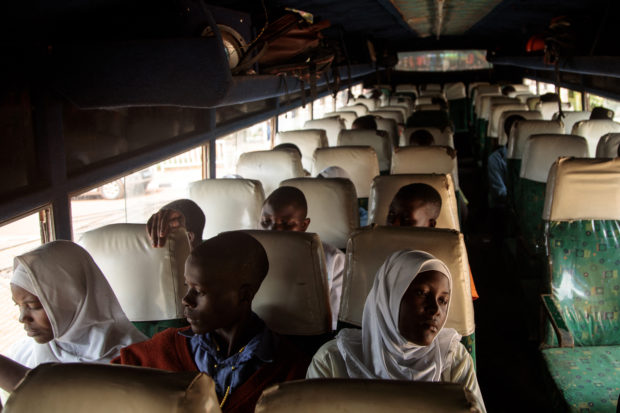Uganda extends Ebola lockdown in two hotspots

Students sit on a chartered bus to return to their homes after a directive of the Health Ministry to close all schools two weeks earlier to curb the spread of Ebola in Kampala on November 25, 2022. AFP
KAMPALA — Uganda’s president extended a six-week lockdown Saturday on two districts at the epicenter of an an Ebola outbreak that has claimed 55 lives but said its spread was being curbed.
Since the outbreak was declared on September 20, Ebola has spread across Uganda and reached the capital Kampala, though health authorities this week said case numbers were falling.
The two central districts at the heart of the outbreak, Mubende and Kassanda, were placed under a 21-day lockdown by President Yoweri Museveni on October 15.
The measures — including a dusk-to-dawn curfew, a ban on personal travel, and the closure of markets, bars and churches — were extended on November 5 by another 21 days.
On Saturday, Museveni ordered that the lockdown on Mubende and Kassanda to be renewed for 21 days, describing the situation as “still fragile”.
Article continues after this advertisement“If we open now and a case appears, we will have destroyed all the gains made in this war,” Museveni said in a national address read by his deputy, Jessica Alupo.
Article continues after this advertisement“I therefore appeal for calm and understanding. Our health workers will continue to do all it takes to save lives and bring the epidemic to an end.”
According to WHO criteria, an outbreak of the disease ends when there are no new cases for 42 consecutive days — twice the incubation period of Ebola.
Health Minister Jane Ruth Aceng told AFP this week that the number of new cases being registered was declining and there were signs Uganda was “winning” the fight.
Uganda’s WHO office said Thursday that as of November 22, no case had been declared for nine days in Kampala, 10 days in Mubende and 12 days in Kassanda.
Museveni said it was too early to celebrate “but overall I have been briefed that the picture is good”.
The outbreak has claimed 55 lives out of 141 cases, the country’s health ministry said on Friday.
Ebola is spread through bodily fluids. Common symptoms are fever, vomiting, bleeding and diarrhea.
Outbreaks are difficult to contain, especially in urban environments.
The strain now circulating is known as the Sudan Ebola virus, for which there is no vaccine, although several potential jabs are heading towards clinical trials.
RELATED STORIES
‘Death every day’: Fear and fortitude in Uganda’s Ebola epicenter
Uganda says two more Ebola cases confirmed in Kampala hospital